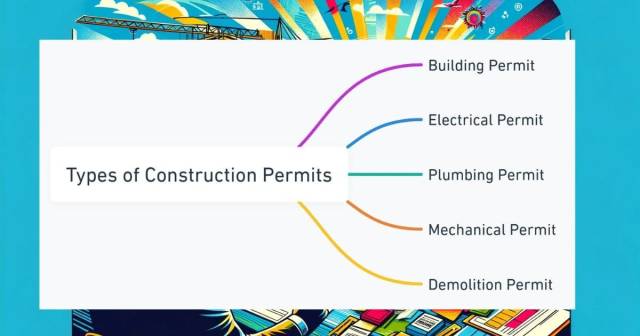Before starting any construction project, it’s important to understand the role of construction permits and the regulations that govern the building process. Whether you’re building a new home, remodeling an office, or adding an extension to a property, securing the right permits is essential. This guide will walk you through what a construction permit is, why it is necessary, and how to navigate the process.
What is a Construction Permit?
A construction permit is an official approval granted by a local government authority that allows construction or renovation work to proceed. It ensures that the project complies with building codes, zoning laws, and safety standards. Construction permits protect the public and property owners by ensuring that buildings are safe to use and built according to the required regulations.
- Key Point: A construction permit acts as a safeguard, ensuring your building project follows local laws and regulations.
Why Do You Need a Construction Permit?
Obtaining a construction permit is a legal requirement for many types of projects. Without one, you risk fines, delays, or even having to tear down unauthorized work. A permit ensures that your project is structurally sound, energy-efficient, and safe for occupancy. It also protects the value of your property, as non-permitted work may not be recognized in property assessments.
Key Reasons to Obtain a Permit:
- Safety: Ensures that construction meets safety standards.
- Legal Compliance: Avoids legal troubles and penalties.
- Insurance: Many insurance policies require that work is permitted.
- Resale Value: Unpermitted work can affect property valuation.
Types of Construction Permits
There are different types of construction permits depending on the nature of the work. Understanding which permits are required for your project will help you stay compliant and avoid complications.

1. Building Permit
A building permit is one of the most common types of permits and is required for new construction, structural changes, and major renovations. It ensures that the building adheres to local building codes.
2. Electrical Permit
If your project involves installing new electrical systems or upgrading existing ones, you will need an electrical permit. This ensures the electrical work is done safely and according to code.
3. Plumbing Permit
A plumbing permit is necessary when adding or changing plumbing systems, such as installing new pipes, water heaters, or bathroom fixtures.
4. Mechanical Permit
For projects involving heating, ventilation, or air conditioning (HVAC) systems, a mechanical permit is required. This guarantees that HVAC work meets safety and efficiency standards.
5. Demolition Permit
If a structure needs to be demolished as part of your project, you must obtain a demolition permit to ensure the safe removal of the building and any hazardous materials.
How to Apply for a Construction Permit
The process of applying for a construction permit typically involves several steps. Although it can vary by location, the following general guidelines will help you understand how to get started.
1. Check Local Regulations
Each city or county has its own building codes and zoning laws. Before beginning your project, research the local regulations to determine what kind of permits are required for your specific project.
2. Prepare the Necessary Documents
When applying for a permit, you will need to submit detailed plans and drawings of the project. These documents should include floor plans, site layouts, and descriptions of the work to be done.
3. Submit the Application
Once you have gathered the required documentation, submit your application to the local building department. Many municipalities now offer online submission options, which can make the process faster and more convenient.
4. Wait for Approval
The approval process may take several weeks, depending on the complexity of your project. During this time, the building department will review your plans to ensure they comply with local codes and regulations.
5. Schedule Inspections
After receiving your construction permit, you will need to schedule inspections at various stages of the project. Inspections ensure that the work is being carried out correctly and safely.
What Happens If You Don’t Get a Construction Permit?
Failing to obtain a construction permit can lead to a range of problems. Most importantly, you may face fines or penalties from your local government. Additionally, work done without a permit may need to be removed or redone, resulting in increased costs and delays.
Furthermore, if you try to sell your property and the buyer discovers unpermitted work, it could complicate the sale. Lenders and insurance companies often refuse to provide financing or coverage for properties with non-compliant construction.
- Key Point: Skipping the permit process can lead to fines, delays, and problems when selling or insuring your property.
Tips for Navigating Construction Permits and Regulations
Here are a few tips to help make the permit process smoother:
- Start Early: Don’t wait until the last minute to apply for a permit. It can take time to get approval, so begin the process as early as possible.
- Hire a Professional: If you’re unsure about the permit process, consider hiring a contractor or architect who is familiar with local building codes and regulations. They can help ensure that everything is in order.
- Keep Records: Always keep copies of your approved permits and inspection reports. These documents may be needed for future reference or when selling your property.
- Don’t Overlook Small Projects: Even smaller projects, like adding a deck or replacing windows, may require permits. It’s better to check with your local authorities than assume no permit is needed.
Conclusion🎯
Understanding construction permits and regulations is crucial for any building project. These permits not only ensure that your project complies with local codes and safety standards, but they also protect you from legal and financial issues down the road. By following the correct procedures, you can avoid potential fines and delays, ensuring that your construction project proceeds smoothly.
